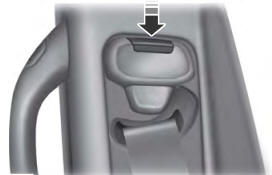Ford Explorer: Parking Aid - Vehicles With: Rear Parking Aid / General Procedures - Azimuth System Check
Check
-
NOTE: The object used in this system check can be fabricated using a 9 cm diameter (3 in I.D.) pipe, 100 cm (39 in) in length (available as Polyvinyl Chloride (PVC) pipe, or similar from a hardware or plumbing supply.
NOTE: The following system check should be carried out with the vehicle on a level surface.
NOTE: Actual sensor arrangement may differ from the configuration shown.
Distribute the test objects evenly across the bumper as shown. Refer to the specifications in this section.
.jpg) |
-
Turn the ignition switch to the ON position, engine off.
-
Apply the parking brake.
-
Select REVERSE (R) for rear parking aid.
-
Select DRIVE (D) for front parking aid.
-
NOTE: The system provides audio warnings only when the vehicle is moving or when the vehicle is stationary and the detected obstacle is less than 12 in (30 cm) away from the bumper.
Using a diagnostic scan tool, monitor the parking aid sensor distance Parameter Identifications (PIDs) to verify the objects are detected when placed in the specified locations (P1, P2, P3, P4 and P5).
 Diagnosis and Testing - Parking Aid
Diagnosis and Testing - Parking Aid
Diagnostic Trouble Code (DTC) Chart
Diagnostics in this manual assume a certain skill level and knowledge of Ford-specific diagnostic practices. REFER to: Diagnostic Methods (100-00 General Informati..
 General Procedures - Elevation System Check
General Procedures - Elevation System Check
Check
Turn the ignition ON, engine OFF.
Set the parking brake.
Place the gearshift in REVERSE (R) for rear parking aid sensors...
Other information:
Ford Explorer 2020-2026 Service Manual: Removal and Installation - Battery Tray
Removal NOTE: Removal steps in this procedure may contain installation details. Remove the battery. Refer to: Battery (414-01 Battery, Mounting and Cables, Removal and Installation). Detach the battery vent hose from the battery tray...
Ford Explorer 2020-2026 Owners Manual: Breaking-In & Reduced Engine Performance
Breaking-In You need to break in new tires for approximately 300 mi (480 km). During this time, your vehicle may exhibit some unusual driving characteristics. Avoid driving too fast during the first 1,000 mi (1,600 km). Vary your speed frequently and change up through the gears early...
Categories
- Manuals Home
- 6th Generation Explorer Owners Manual
- 6th Generation Explorer Service Manual
- Body and Paint
- Description and Operation - Identification Codes
- Traction Control
- New on site
- Most important about car
Seatbelt Height Adjustment
WARNING: Position the seatbelt height adjuster so that the seatbelt rests across the middle of your shoulder. Failure to adjust the seatbelt correctly could reduce its effectiveness and increase the risk of injury in a crash.

